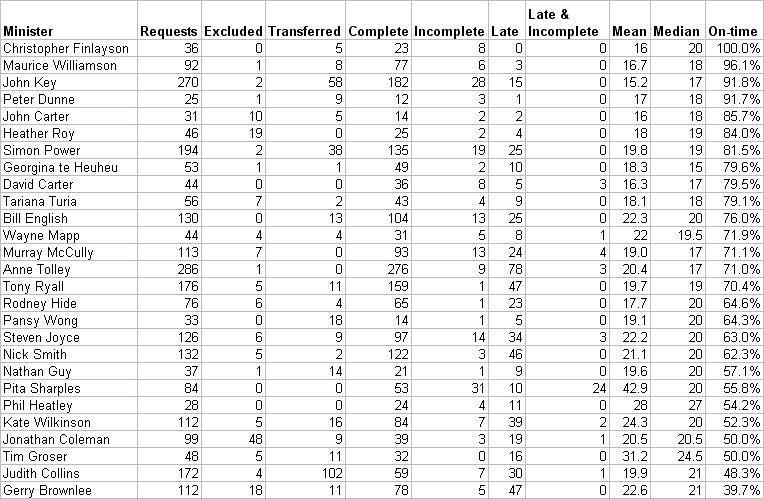For the past three months, I've been working on a project to compile performance statistics for Ministers' and government departments' handling of Official Information Act requests. The first results, for Ministers, are presented in the table below:

All information was obtained from the relevant Ministers using the OIA. Requests is the total number of requests received by the Minister during FY2009 (1 July 2009 - 30 June 2010). Excluded is the number of requests which were excluded from the data set due to poor data or being cancelled. Transferred is the number of requests transferred to another Minister or Department. Complete is the number of completed requests with good data. Incomplete is the number of requests which had not been completed at 1 July 2010. Late is the number of complete requests which were late; a request was counted as late if it had taken longer than 20 working days and had not been extended
. Late & Incomplete is the number of incomplete requests which were late (as defined above) at 1 July 2010. Mean and Median are the mean and median response times in working days. On-time is the percentage of requests answered on-time. Chris Finlayson's data covers only the period from 1 January - 30 June 2010, and earlier records could not be obtained. Paula Bennett does not appear on the table because she refused to cooperate with the project, offering various excuses before ultimately claiming that compiling the data would not be in the public interest. Her refusal is now the subject of a complaint to the Ombudsman.
This is the crudest of performance data. It does not look at the quality of responses, or take any account of the size or complexity of requests. It looks only at timeliness. Even so, the picture it paints is appalling. Only one Minister, Chris Finlayson, met the legal standard of responding to requests "as soon as reasonably practicable, and in any case not later than 20 working days after the day on which the request is received". Every other Minister is breaking the law. Overall, only 71% of requests were answered on time, while four Ministers - Jonathan Coleman, Tim Groser, Judith Collins, and Gerry Brownlee, made timely responses in only 50% of cases.
This is not a problem of ignorance. While the survey of departments is not yet complete, they showed a far better overall record, with 88% of requests answered on-time, and three (DPMC, the ERO, and Ministry of Pacific Island Affairs) achieving a 100% on-time rate. Their mean and median response times were far quicker, with several taking less than ten working days (indicating a commitment to the "as soon as reasonably practicable" standard). The busiest department, the Ministry of Justice, managed a 97.7% on-time rate and 5 working day median response time despite receiving more than 1800 requests. We know how to deal with OIA requests in a timely fashion. But Ministers appear to have chosen not to. The OIA has been law for 28 years. After that long, their failure can only be interpreted as wilful and deliberate.
They get away with this for two reasons: firstly, there are no legal penalties for ignoring the OIA. They are not fined or censured for late requests, or even for the sort of gross thwarting of the law we see from Ministers like Collins and Brownlee. Secondly, they publish no statistics on their performance, so we can't tell if they're behaving lawfully.
The results above should convince everybody that this situation needs to change. You can't manage what you can't measure, and we can't hold politicians accountable for their actions when we do not know about them. Accountability demands transparency, which is why we have the OIA in the first place. Compiling and publishing these sorts of statistics should not be left to unpaid volunteers - it should be a statutory requirement of every Minister and every agency. That way, we can see who is performing and who is not, and hold politicians accountable in Parliament, in the media and at the ballot box for any failures.
